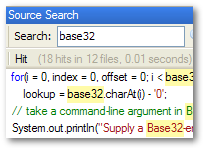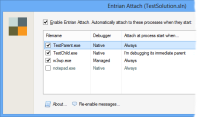Entrian Source Search 1.7.7: Out-of-process indexing
Sunday, April 2nd, 2017 by Richie HindleI’m very pleased to announce Entrian Source Search 1.7.7, which includes one invisible change:
- Indexing is now done by an external process, rather than within the Visual Studio process.
That means no more sharing of one increasingly-cramped 4GB address space between Visual Studio and the Entrian indexer, which is good news for anyone who’s ever suffered an OutOfMemoryException at the hands of Source Search.
This change also introduces the -watch switch to the command line tool ess.exe. When you pass that switch to a create or update command, ess.exe continues to run at the end of the update, watching for changed files and updating the index as they change. That means you can use ess.exe to keep an index up to date just as you would a Visual Studio session (which is in fact what Source Search itself is now doing behind the scenes).
As always, the upgrade is available for free to all licensed users, and as a 30-individual-day trial for everyone else. You can download it from the download page or the gallery.












